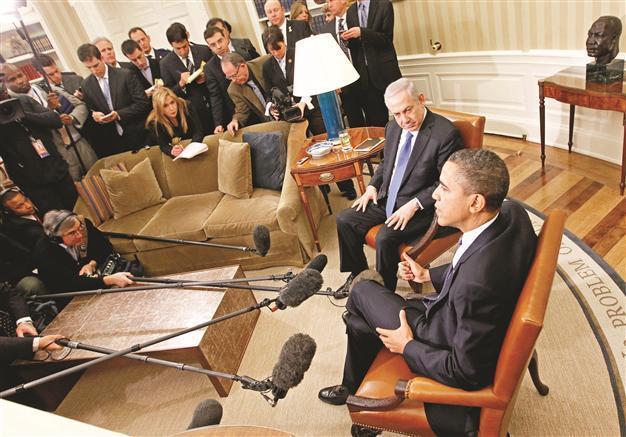‘Loose war talk’ gives US, Israeli ties relief
WASHINGTON / JERUSALEM

President Barack Obama meets with Israeli Prime Minister Benjamin Netanyahu, Monday, March, 5, 2012, in the Oval Office of the White House in Washington. AP photo
U.S. President Barack Obama’s declaration that he stood by Israel against a nuclear Iran has somewhat repaired his country’s troubled ties with Israel amid widespread praise from Israeli officialsas Prime Minister Benjamin Netanyahu’s meet with the U.S. leader at the White House.
Obama assured Netanyahu yesterday Washington “has Israel’s back” but said there was still time
for diplomacy. “Both the prime minister and I prefer to solve this diplomatically,” Obama said as he and Netanyahu began several hours of White House consultations.
“The U.S. will consider all options in confronting what it sees as the unacceptable outcome of an Iranian bomb,” Obama said. On his side, Netanyahu said: “Israel and America stand together.” He added that Israel was a sovereign nation with the right to defend itself. A day before meeting with the
prime minister, Obama said “loose talk of war” only played into Iran’s hands. The Obama administration
believes tough new sanctions – which have bitten deep into Iran’s economy – must be given time to
work and has not yet concluded Tehran has made a decision to develop nuclear weapons. In a highprofile
speech to the pro-Israeli lobby group American Israel Public Affairs Committee (AIPAC) on March 4, Obama tried to soothe Israeli concerns by saying he would not hesitate to use force against Iran if necessary
while stressing he hoped to resolve the issue diplomatically.
Obama said, “Iran’s leaders should have no doubt about the resolve of the United States. […] Iran’s leaders should know that I do not have a policy of containment; I have a policy to prevent Iran from obtaining a nuclear weapon. And as I’ve made clear time and again during the course of my presidency, I will not hesitate to use force when it is necessary to defend the United States and its interests.”
At the same time, he appeared to caution against a unilateral Israeli strike. He said “loose talk of war” has caused tensions to rise and emphasized that “now is the time to let our increased pressure sink in.” Obama’s tough language won praise in Israel as an unprecedented show of support for the country.
“We’ve never heard such a supportive speech in Israel,” Deputy Prime Minister Silvan Shalom told Israel Radio on March 5, adding that U.S.-Israel coordination was now “almost perfect.” Israeli President Shimon Peres, who had a meeting with Obama on March 4, said he “came out with the feeling that the man is determined to prevent Iran from obtaining nuclear weapons.”
It remained unclear, however, whether Netanyahu would be persuaded. Reacting to Obama’s speech, Netanyahu gave few indications, saying “more than everything, I value his statement that Israel must be able to protect itself from all threats.” Meanwhile, the head of the U.N. nuclear agency yesterday said his organization has “serious concerns” that Iran may be hiding secret atomic weapons work.
“The agency continues to have serious concerns regarding possible military dimensions to Iran’s nuclear program,” Yukiya Amano told to the 35-nation IAEA board. “As Iran is not providing the necessary cooperation ... the agency is unable to provide credible assurance about the absence of undeclared nuclear material and activities in Iran, and therefore to concluded that all nuclear material in Iran is in peaceful activities.”
Compiled from AFP and AP stories by the Daily News staff.
















